Navigating the open seas of the hospitality industry means dealing with the ever-changing winds of demand and prices. A solid revenue management system (RMS) serves as a trusted helm, guiding in the right direction and making that journey smoother. With the right RMS in place, hotels and vacation rentals can optimize room pricing, enhance occupancy rates, and boost overall revenue. From analyzing real-time data to making forecasts about future trends, these systems provide functionality for staying ahead in a dynamic hospitality market.
This article offers insights into the essential features of RMS and introduces the top providers shaping this sector.
What is a revenue management system for hotels?
Revenue management is a strategic approach to understanding and anticipating consumer behavior to determine optimal pricing strategies. At its core, it's about using real-time data to make informed decisions, ensuring the right products and services are sold to the right consumer at the right price and time. When applied to the hospitality industry, revenue management focuses on maximizing room revenues by predicting room demand and subsequently adjusting prices.
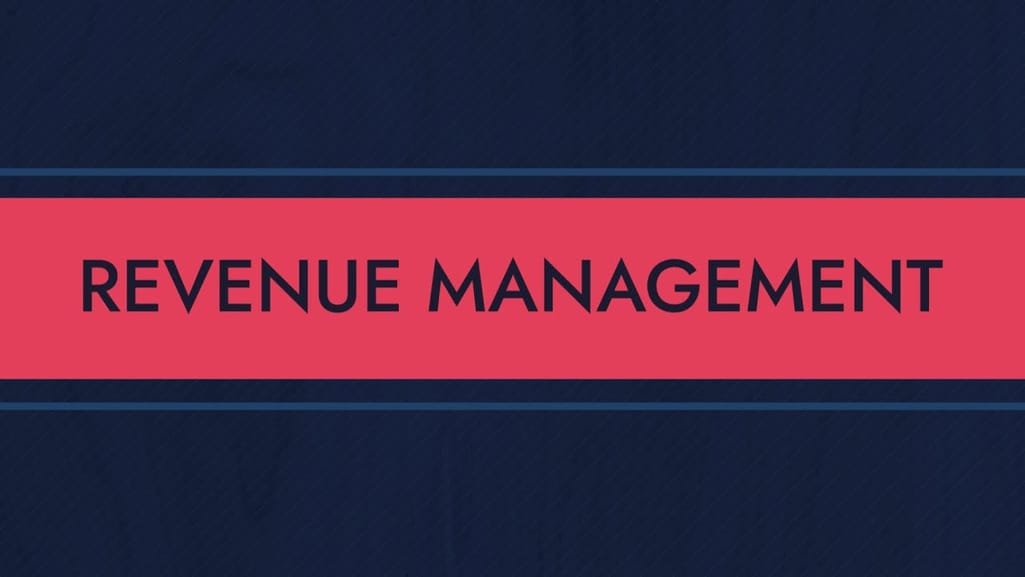

Learn more about hotel revenue management in our video.
To streamline this process, there is a digital tool called a revenue management system (RMS). An RMS is a specialized software that uses data-driven insights and advanced algorithms to analyze market conditions, track demand, and set room rates. Having crucial revenue management components such as price optimization, demand forecasting, and reporting under the hood, RMS empowers hotels to make strategic decisions from one unified platform.
Benefits of adopting hotel revenue management software
Integrating hotel revenue management software in the hospitality industry is essential not only for its computational prowess but also for the game-changing benefits it provides.
Centralized control. An RMS unifies various revenue management tasks under one centralized console, offering hoteliers a comprehensive view of their operations. This integrated approach ensures that all strategies align seamlessly with the overall revenue objectives, enhancing effectiveness and coherence.
Coordinated pricing adjustments. With an RMS, the era of logging into numerous systems to modify prices across diverse distribution channels is over. It simplifies this process, guaranteeing uniform pricing across all platforms, minimizing potential inconsistencies, and helping save valuable time.
Improved property KPIs. An RMS can significantly enhance KPIs such as Revenue Per Available Room (RevPAR). These improvements boost the hotel's gross income and positively impact the net profit, creating a beneficial domino effect.
Scalable solutions for different needs. Revenue management software for hotels is generally flexible. An RMS ensures that smaller properties harness the maximum potential revenue for each room, given their limited inventory. On the other hand, in larger hotels with extensive room inventories and complex pricing structures, manually managing revenue can become an arduous task prone to errors. In such scenarios, RMS steps in to automate, streamline, and efficiently manage the intricate revenue dynamics, thus safeguarding against lapses and elevating overall revenue performance.
So whatever the property you own and/or manage, incorporating an RMS is the right strategic decision that can help enhance your revenue-related operations.
Key features of a hotel revenue management system
Many hotel revenue management solutions are flooding the market, each having many features. But how do you determine which one aligns best with your business goals? To help navigate this complex landscape, we delve into the key capabilities of RMS and the criteria to consider when selecting. Whether you're a boutique hotel or a sprawling resort chain, understanding these elements ensures that you harness the full potential of revenue management to drive growth and guest satisfaction.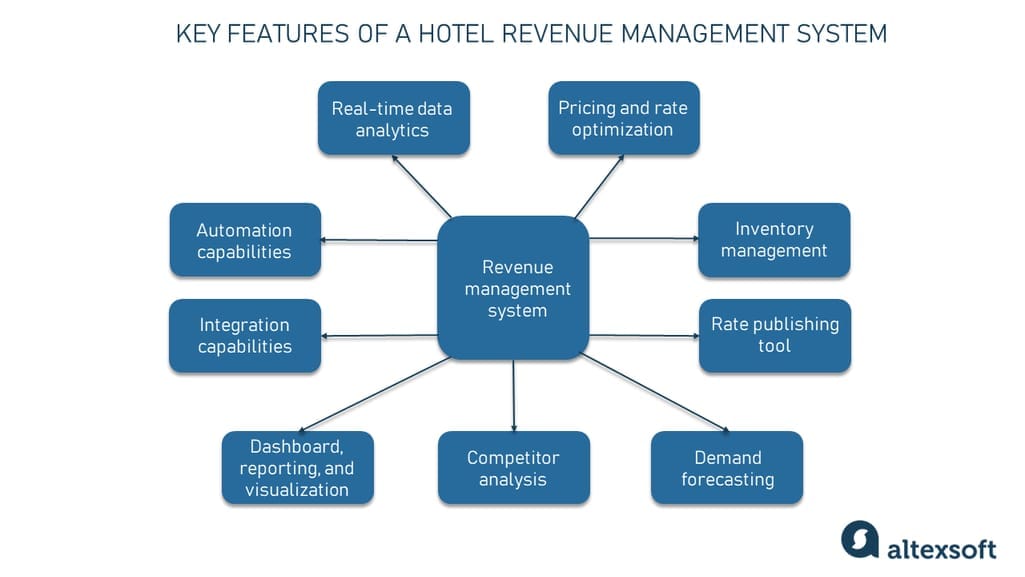
Key features of a hotel revenue management system.
Real-time data analytics
What it does. Real-time data analytics constantly collect and process information on bookings, cancellations, and other relevant metrics. This allows for an immediate understanding of a hotel's performance and the market's behavior at any given moment.
Operational relevance. Access to real-time data means revenue managers and hoteliers can immediately spot trends, challenges, or opportunities as they arise, rather than waiting for end-of-day or end-of-week reports. This immediacy aids in proactive decision-making.
Strategic importance. Real-time data analytics not only address immediate needs but also guide long-term strategies. By understanding current trends, hotels can anticipate market shifts, adjust pricing models, and refine their overarching revenue plans, preparing them for future opportunities and challenges.
Pricing and rate optimization
What it does. This RMS feature processes historical and real-time data to determine the most advantageous room rates for a particular period. Using machine learning algorithms and market insights, the RMS recommends dynamic pricing adjustments tailored to current market conditions and predicted demand.
Operational relevance. From an operational perspective, automated rate recommendations remove guesswork and substantially reduce the manual effort required in rate setting. As market conditions change, the RMS reacts in real-time, ensuring the hotel’s rates are always competitive and aligned with the broader market landscape.
Strategic importance. Optimized pricing ensures that a property maximizes its revenue opportunities. Whether it’s capitalizing on peak demand or adjusting to calmer periods, a well-calibrated RMS guides revenue managers in making informed decisions. This proactive approach boosts revenue and positions the property advantageously in its competitive set.
Inventory management
What it does. The inventory management module in revenue management software oversees the distribution and allocation of a hotel’s rooms. It keeps track of which rooms are booked, which are available, and which are out of order, ensuring that overbookings or misallocations don't occur.
Operational relevance. Effective inventory management streamlines the check-in/checkout processes and ensures room assignments are optimized for guest preferences and operational efficiency. This can include managing room types, views, and specific guest requests.
Strategic importance. By understanding room demand and availability in real-time, hoteliers can make informed decisions about rate adjustments, promotions, or targeted marketing efforts. For instance, rates can be adjusted accordingly if the RMS identifies a high demand for a specific room type.
Rate publishing tool
What it does. The rate publishing tool is a centralized feature that automates updating and synchronizing rates across multiple distribution channels. It streamlines rate management by ensuring prices remain consistent across all platforms, which is crucial for maintaining rate parity.
Operational relevance. This tool significantly reduces the time and effort involved in rate management. Instead of logging into multiple extranets and manually entering rate information, revenue managers can efficiently update rates in one central location. This prevents potential errors and ensures timely rate updates, especially during peak booking seasons or promotional periods.
Strategic importance. Consistent rate presentation across all channels is pivotal for building guest trust. Inconsistencies in rates can lead to a loss of confidence among potential guests, who might question the hotel's pricing integrity. Hotels can foster a sense of reliability and transparency with their potential clients by ensuring rate parity.
Demand forecasting
What it does. Demand forecasting in an RMS leverages historical data, market trends, and various external factors to predict future room demand. Analyzing past booking patterns, seasonality, local events, and even weather or flight schedules provides accurate projections on how many rooms a hotel can expect to sell in a given period.
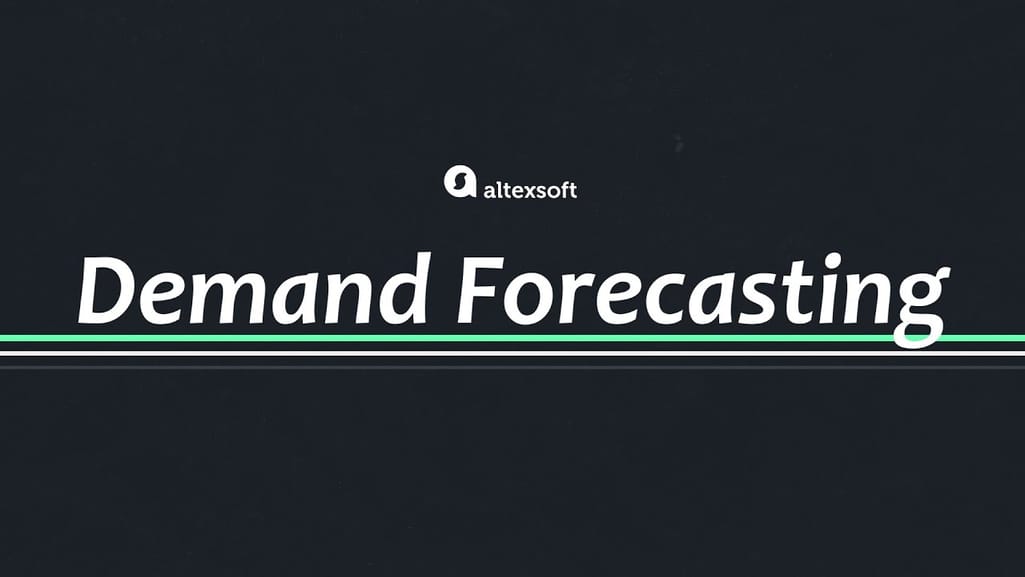

Check our short explanatory video about demand forecasting and predictive analytics
Operational relevance. From an operational standpoint, understanding future demand helps hoteliers manage their inventory efficiently. It aids in making informed decisions about room allocation, setting stay restrictions, or preparing for periods of high occupancy. Properly anticipating demand ensures the hotel is well-prepared to handle influxes and lulls in bookings.
Strategic importance. On a strategic level, insights into when demand will be high or low can help revenue managers adjust room rates dynamically to maximize revenue. During periods of anticipated high demand, prices can be raised, and during lower demand periods, promotions or discounts can be offered to stimulate bookings.
Competitor analysis
What it does. The competitor analysis feature within an RMS enables hoteliers to monitor and assess their direct competitors' pricing strategies and room rates. This module often aggregates data from various distribution channels, websites, and OTAs to provide a comprehensive market landscape. It offers insights into how a hotel's rates compare with its competitors, highlighting opportunities or potential areas of concern.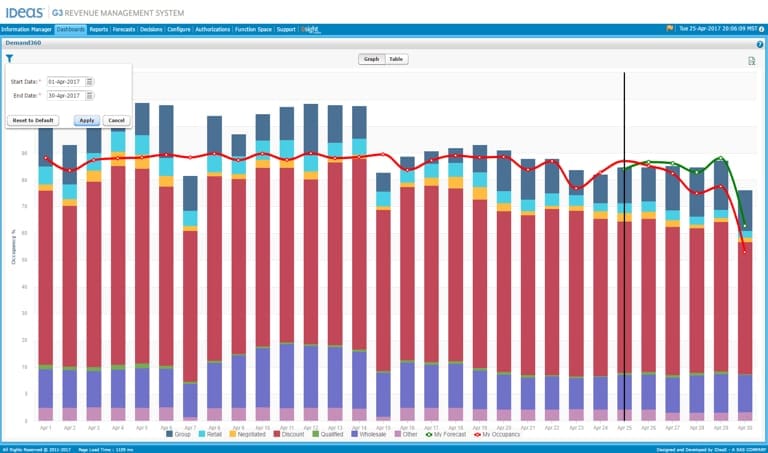 HotelTechReport
HotelTechReport
Operational relevance. On a day-to-day basis, this tool assists revenue managers in making timely rate adjustments. If a competitor drops their prices or launches a promotion, the hotel can respond quickly, ensuring their rates remain competitive. Conversely, if competitors raise their rates or are fully booked, they can increase prices without the risk of being outpriced.
Strategic importance. By understanding the competition's behavior, hotels can develop long-term pricing strategies that ensure they remain attractive to guests while maximizing revenue.
Dashboard, reporting, and visualization
What it does. The reporting feature centralizes a hotel's key revenue metrics in a user-friendly interface, clearly representing occupancy rate, average daily rate (ADR), revenue per available room (RevPAR), and booking sources. Leveraging interactive charts and heat maps, users can consider specific data points, assess periods of peak demand, and monitor booking pace.
Operational relevance. A comprehensive dashboard eliminates the need to sift through disjointed data, presenting all vital information at a glance. This immediate access facilitates quicker reactions to market shifts, ensuring rates and availability align with demand patterns.
Strategic importance. Harnessing the power of visualized data aids in crafting effective revenue strategies. For instance, a sudden spike in RevPAR on the dashboard could indicate a successful promotional campaign, while a detailed report might highlight underperforming booking channels.
Integration capabilities
What it does. Integration capabilities ensure that a revenue management system can seamlessly connect with other essential hotel software solutions, such as a property management system (PMS), central reservation system (CRS), customer relationship management (CRM) platform, channel manager, and booking engine. This unified approach ensures data consistency, reduces manual data entry, and ensures all systems are up to date with real-time information.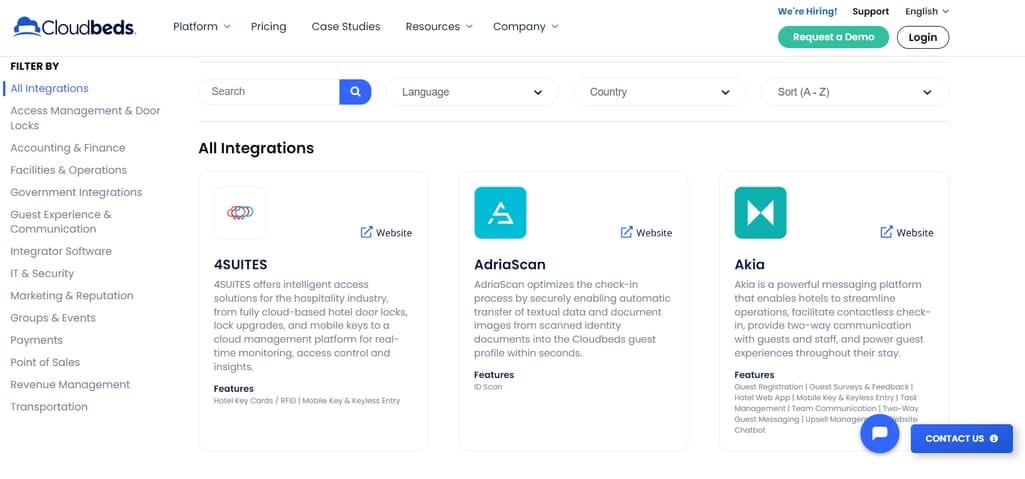
Cloudbeds integrations marketplace. Source: Cloudbeds
Operational relevance. For day-to-day operations, integration means less time spent on manual data transfers and reduced risk of errors or discrepancies. When a new booking is made, availability and guest data are automatically updated across all systems. This streamlined flow of information enhances efficiency, ensuring the hotel staff can focus on guest experiences rather than back-end system management.
Strategic importance. By syncing data across platforms, decision-makers gain deeper insights into guest preferences, booking trends, and revenue patterns. This comprehensive perspective enables more informed strategic decisions, from crafting targeted marketing campaigns to designing loyalty programs tailored to the most valuable guest segments.
Automation in RMS
What it does. Automation within revenue management software enables hoteliers to set predefined rules and criteria, allowing the system to make real-time decisions with little or no manual intervention. This can range from automated room-type pricing adjustments, based on demand and competitor rates, to even a fully autonomous revenue management process where the system analyzes data and implements pricing strategies on its own.
Operational relevance. Automation dramatically reduces the time and effort required for routine tasks for operational efficiency. Instead of manually monitoring and adjusting rates multiple times a day, the RMS, with its automation capabilities, ensures that room prices are always optimized for current market conditions. It also minimizes human errors.
Strategic importance. On a strategic level, automation empowers revenue managers to focus on broader revenue strategies and guest experience initiatives. By trusting the RMS to handle the intricate pricing and inventory management details, hoteliers can allocate more time to explore new revenue opportunities and refine overarching revenue goals.
Hotel revenue management systems: Overview of the key providers
This paragraph highlights key RMS providers, showcasing their standout features to guide your selection process.
Please note: We do not promote any of the software listed below. The choice of the tools was based on their popularity and growth. 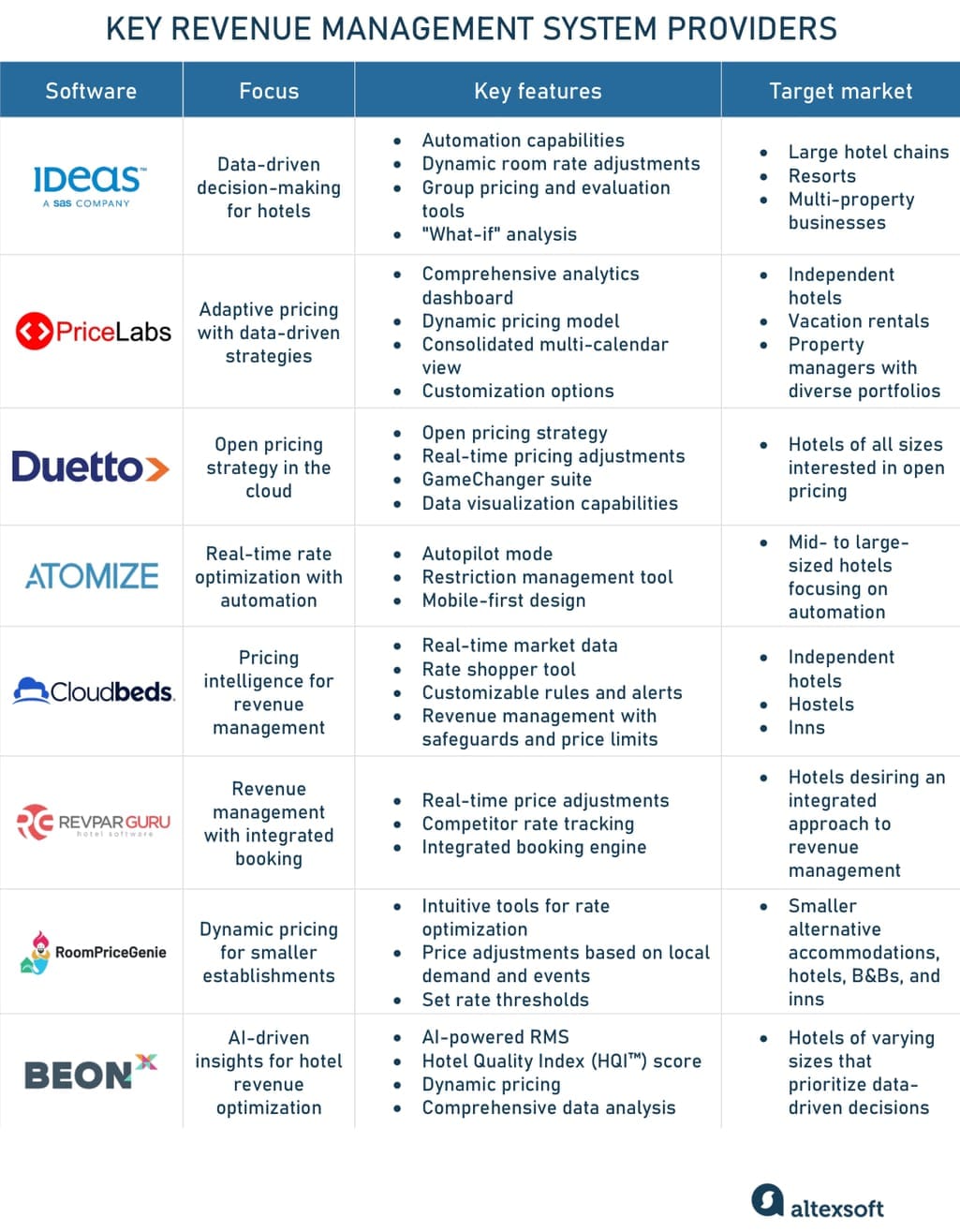
A general overview of the top 8 revenue management system providers.
IDeaS Revenue Solutions: Advanced revenue management for hotels
IDeaS provides revenue management solutions with an emphasis on data-driven decision-making. The platform has been active for over three decades, offering various tools and systems designed to aid hoteliers in revenue optimization.
Standout features. IDeaS' G3 RMS system is notable for its automation capabilities, aimed at reducing the manual workload of revenue managers. It offers dynamic room rate adjustments based on variables such as demand, booking patterns, and market conditions. On top of that, the system provides group pricing and evaluation tools to manage larger booking groups better. Another feature is the “What-if” analysis, which allows users to simulate different scenarios to understand potential revenue outcomes.
Best for: Large hotel chains, resorts, and multi-property businesses, given its advanced features and holistic approach.
PriceLabs: An adaptive solution for pricing
PriceLabs offers a specialized pricing solution tailored to the needs of hoteliers and vacation rental owners and managers, focusing on dynamic, data-driven strategies.
Standout features. One of the things that sets PriceLabs apart is its emphasis on a comprehensive analytics dashboard, which tracks performance and provides actionable insights for revenue enhancement. Their dynamic pricing model is versatile, considering unique variables like local events, seasonal changes, and booking lead times.
The platform's ability to offer a consolidated multi-calendar view for multiple properties or units allows users to manage several listings efficiently, a feature especially beneficial for those with diverse property portfolios. Additionally, PriceLabs provides customization options, including setting minimum stays, longer booking discounts, and date-specific pricing adjustments.
Best for: Independent hotels, vacation rentals, and property managers with diverse portfolios, considering the platform’s adaptability.
Duetto revenue management: Pioneering open pricing strategy
Duetto offers a cloud-centric solution to streamline revenue management for hotels, regardless of their size. Recognizing the dynamic nature of the hotel industry, Duetto's innovation lies in its open pricing strategy.
Standout features. At the forefront of Duetto's offerings is open pricing — a cutting-edge approach that allows revenue managers to price rooms with extreme granularity. Rather than adopting traditional methods based solely on seasons or weekdays, this method takes into account variables such as segments, room types, and distribution channels — all in real-time. This ensures maximized revenue without shutting out potential booking opportunities.
Accompanying this is Duetto's GameChanger suite, an integral tool aiding hotels in crafting intricate revenue strategies that weigh guest loyalty and demand elasticity. The platform's data visualization capabilities further enable users to analyze complex datasets, assisting them in making informed pricing decisions.
Best for: Hotels of all sizes looking for innovative pricing strategies, especially those interested in open pricing.
Atomize RMS: Streamlined automated revenue management
Atomize RMS is a suite of automated solutions tailored for hoteliers, focusing on real-time rate optimization. By decoding the complexities of revenue management, Atomize ensures that hotel rates remain dynamic and competitive.
Standout features. A highlight is the platform's autopilot mode, which allows it to make autonomous rate adjustments based on set parameters, saving hoteliers time and effort. Equally significant is its restriction management tool, offering fine-tuned control to stay rules. This ensures optimal bookings during peak seasons and events.
With its mobile-first design, Atomize enables management teams to swiftly act on insights and make alterations, regardless of their location. Lastly, its seamless integration with various property management systems reinforces its adaptability, catering to various hotel needs.
Best for: Mid to large-sized hotels focusing on automation and real-time rate adjustments.
Cloudbeds: Emphasis on pricing intelligence for revenue management
Cloudbeds introduces a dedicated Pricing Intelligence Engine (PIE) tailored to offer hoteliers sophisticated rate management capabilities.
Standout features. PIE is crafted to deliver real-time market data and automated pricing alerts, helping hoteliers stay competitive. The user-friendly system boasts a visual calendar view for straightforward rate adjustments. You can efficiently monitor competitors through its rate shopper tool, while the integrated reporting suite offers insights into crucial performance metrics. PIE's customizable rules facilitate nuanced rate strategies based on factors like occupancy, stay restrictions, and competitive rate shifts. Moreover, its inherent safeguards maintain rate strategies within optimal parameters, mitigating the risk of significant deviations.
Best for: Independent hotels, hostels, and inns seeking an integrated property and revenue management solution.
RevPar Guru: Combining RMS with booking engine
RevPar Guru offers a sophisticated blend of revenue management and an integrated booking engine to maximize a hotel's profitability while simplifying reservations.
Standout features. RevPar Guru sets itself apart with real-time price adjustments, constantly calibrating rates in response to the prevailing market conditions. In addition, its system is adept at tracking and analyzing competitor rates, offering insights into the broader market landscape. An integrated booking engine streamlines the reservation process, ensuring guests have a seamless experience from browsing to booking.
Best for: Hotels desiring an integrated approach to revenue management and direct booking.
RoomPriceGenie: Simplified dynamic pricing
RoomPriceGenie is designed to assist smaller hotels and alternative accommodations in leveraging dynamic pricing strategies without the complexity of larger systems.
Standout features. RoomPriceGenie emphasizes ease of use, offering intuitive tools for rate optimization. The platform adjusts prices based on local demand, events, and historical data, ensuring that smaller establishments remain competitive. Additionally, it allows for setting minimum and maximum rate thresholds, offering a degree of manual oversight while benefiting from automated suggestions.
Best for: Smaller alternative accommodations, hotels, B&Bs, and inns that aim for simple yet effective dynamic pricing strategies.
BEONx: Harnessing AI for strategic hotel revenue management
With a commitment to data-driven decisions, BEONx offers an AI-driven platform to deliver insights and actionable strategies for optimizing hotel revenue.
Standout features. Central to BEONx is its AI-powered platform that — as the company states — goes beyond common revenue management. This system meticulously analyzes a wide spectrum of data, from market dynamics and competitor pricing to granular internal hotel metrics, resulting in optimal and adaptive pricing strategies. One distinguishing feature is the Hotel Quality Index (HQI™) score, a unique metric that quantifies a hotel's market position by evaluating diverse quality parameters. This provides a holistic view of the hotel’s market presence. Additionally, the platform emphasizes dynamic pricing, adjusting real-time rates to match demand.
Best for: Hotels of varying sizes that prioritize data-driven decisions and a comprehensive view of their market standing.
Keep in mind that these eight tools are just a small portion of revenue management systems available on the market. If the ones presented here do not meet your requirements, keep searching, but make sure to assess them against the criteria we provided. Also, read a few more recommendations on how to make the choice journey smoother.
How to choose the right hotel RMS provider: Tips and selection criteria
Making the right choice regarding an RMS provider can be the difference between maximizing your revenue potential or missing out on significant opportunities. As you sift through the myriad options, here are some essential tips to help you find the best fit for your hotel or hospitality business.
Understand your business needs. Before diving into the various RMS options, grasp what you want to achieve. Whether optimizing room rates, analyzing guest behavior, or forecasting demand, understanding your needs can narrow your search considerably.
Check reviews. As obvious as it is, user reviews can offer invaluable insights. However, it’s better to go beyond the star ratings and explore what other hoteliers appreciate or find lacking in a system. This can give you a better understanding of what to expect.
Prioritize integration. The RMS you choose should seamlessly integrate with your existing systems — be it your property management system, point of sale, central reservation system, or channel manager. This ensures a smooth data flow and maximizes operational efficiency.
Consider future scalability. Your chosen RMS should be scalable, catering to your current needs and future growth. As your business expands, you don't want to be restricted by software limitations.
Evaluate customer support. Efficient and responsive customer support can be a lifesaver. Make sure that the RMS provider offers timely support, especially during critical times when you most need assistance.
Check for demos to test the waters. Before committing, ask for a demo. This allows you to familiarize yourself with the platform and its features as well as gauge its ease of use. It's a practical step to ensure the system aligns with your operational workflow.
The world of RMS is vast, and the right choice can significantly influence your revenue outcomes. By considering the above factors, you're better positioned to make a decision that complements your business objectives and drives growth.
